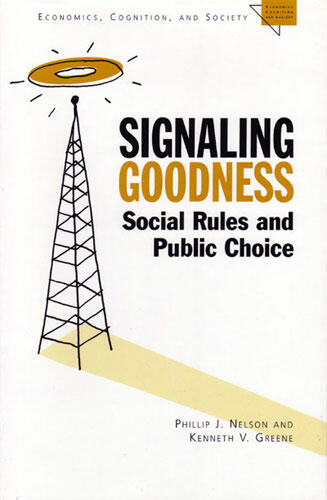A new approach to analyzing political and charitable behavior posits that morality significantly affects that behavior
Description
Political, intellectual, and academic discourse in the United States has been awash in political correctness, which has itself been berated and defended -- yet little understood. As a corrective, Nelson and Greene look at a more general process: adopting political positions to enhance one's reputation for trustworthiness both to others and to oneself.
Phillip Nelson and Kenneth Greene are Professors of Economics in the Department of Economics at the State University of New York, Binghamton.
Phillip J. Nelson, Emeritus Professor of Economics, Binghamton University, who wrote his dissertation under Nobel Prize-winner George Stigler, has made some fundamental contributions to the literature on the information content of advertising. Recently, as did his mentor in his career, he has turned his attention to the economics of politics. Signaling Goodness has its source in his interest in both areas since it concerns the ways in which political positions and ethical behavior convey information.
Kenneth V. Greene is Professor in the Department of Economics, Binghamton University. His dissertation was written under Nobel Prize-winner James Buchanan. He has been a frequent contributor to the literature that develops and tests theories in the area of public choice. His previous book, Fiscal Interactions in a Metropolitan Area (with William B. Neenan and Claudia D. Scott), is widely cited in texts in urban economics and state and local finances. His interest in developing testable theories of the political process helped to generate the book's focus: what theories of ethical behaviors can both explain such behavior, including what is called political charity, and lead to testable hypotheses.

